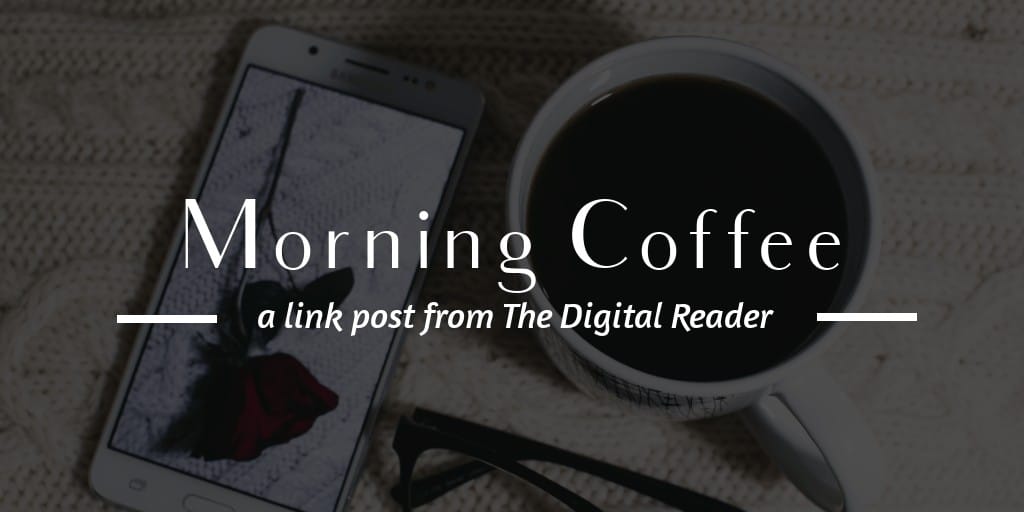Monday Coffee – 3 February 2020

Here are a few stories to read this Monday morning.
- David Gaughran questions the value of going viral.
- Salinger tried to secretly publish a book in 1996, but he didn’t count on Amazon seeing the Library of Congress filing for the book, and creating a listing. Madness ensued.
- Ligatures in programming fonts are such a terrible idea that I am surprised anyone would even think of using them.
- Engadget just published a retrospective review of the original Kindle.
- Cory Doctorow delves into how copyright law has been distorted to serve the interests of major corporations.
- Macmillan CEO and Apple co-conspirator Jon Sargent held an AMA at ALA Midwinter. I missed it (I was in a meeting) but PW was there.
- The tales coming from the worker side of Amazon’s 15 year old Mechanical Turk service are just as horrifying as from other parts of the gig economy.
- EFF explains how Yourtube’s automated copyright filter continues to violate users' fair use rights.
- Researchers are now using Wattpad as a source for analyzing trends in book culture.
- The (legacy) US book publishing industry is as white bread today as it was four years ago.


Comments
Disgusting Dude February 3, 2020 um 9:34 am
You’re missing an adjective:
"The US book publishing industry is as white bread today as it was four years ago. "
Should be:
"The traditional US book publishing industry is as white bread today as it was four years ago."
The gone but not forgotten Author Earnings report pointed out that 90% of urban minority litfic was Indie.
And on tbe Indie world nobody filters out authors or characters by ethnicity.
Different world, different rules.
Nate Hoffelder February 3, 2020 um 10:12 am
Good point! My statement completely overlooks all the small press and indie authors.
Tom Wood February 3, 2020 um 10:56 am
Thank you for including the Plos One research article about Wattpad readers. Of particular interest is the section on the emotional reactions to specific portions of the text in the books they studied.
A couple of excerpts that may seem 'duh' but which also show that young readers appreciate witty writing:
"Looking at the most commented paragraphs, we discovered that readers like when characters react to violence, bullies, and rude people. Not really in a physical way, rather with sarcasm and words that can shut up the abuser. Similarly, candid characters trigger positive comments, whether they are outspoken or it is only their thoughts that are reported."
"Regarding our third hypothesis, we can affirm that comparing the sentiment of stories and comments provided empirical evidence to link textual features to readers’ emotional response. From the analysis of matching and diverging intervals we got confirmation that witty characters are very much appreciated, as already suggested by the most commented paragraphs. Moreover, having secondary characters whose personality create a contrast with that of the protagonists is a strategy that amplifies readers’ reaction."
This section is particularly funny:
"With respect to the innovative methodology that we applied, we gained some valuable feedback. Concerning the attribution of sentiment value to comments, we noted that positive response did not correspond to positive sentiment only. For instance, it is true that many comments reacting to witty characters mention “yes”, “well said”, “I’m enjoying this”, “I love her”, but there are also many enthusiastic expressions like “burn”, “slay”, “savage”, “damn”, which are considered as negative sentiment. Syuzhet default dictionary is not suited to correctly interpret neither this kind of comments nor the lingo used by the Wattpad community (e.g., “lmao” for “laugh my ass out”, “lol” for “laugh out loud”, “cinnamon roll” for “cute, sweet”, etc.). As these examples show, an important thing to remember is that negative sentiment does not necessarily mean that reader response is negative. A specific sentiment dictionary will need to be prepared in order to assign appropriate values to these expressions."
That helps explain the divergence in the graphs where the emotional valence of the text goes up while the valence of the comments goes down.
Federico Pianzola February 3, 2020 um 7:13 pm
I’m glad you liked our article.
Sentiment analysis is always tricky to interpret, I would refrain from drawing strong conclusions based on that only. We used it as a tool to identify noteworthy intervals regarding the text-response relationship and have been careful to balance it with other methods, as you noted.
Anyway, I think it is definitely worth it to do more research on Wattpad. it’s such an important resource to understand how teenagers read.